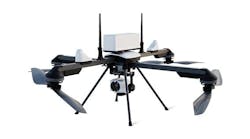New Study Shows Strong Public Supports for Use of Unmanned Aircraft
Arlington, Va. — An overwhelming majority of Americans support the use of unmanned aircraft for homeland security, search and rescue, and fighting crime, according to a new poll released today. The study, conducted by Institute for Homeland Security Solutions and RTI International, shows that the majority of the general public supports the use of unmanned aircraft in the United States for a wide array of uses.
According to the national study, 57 percent of the general public supports the use of unmanned aircraft systems (UAS) for any application. When asked about specific uses of the technology, support was significantly higher, with 88 percent of respondents supporting UAS for search and rescue operations. In addition, two-thirds of Americans support their use in homeland security missions.
The study of 2,000 respondents, conducted in March 2013, gauged perceptions about of unmanned aircraft in the U.S. Additional findings include:
• 88 percent of the general public supports their use in search and rescue operations
• 67 percent support their use in homeland security missions
• 63 percent support their use in fighting crime
• 61 percent support their use in commercial applications
To read the full report, click here.
“The tremendous support that Americans have for the use of unmanned aircraft systems in the U.S. underscores the public’s understanding of the widespread benefits,” said Michael Toscano, president & CEO of the Association for Unmanned Vehicle Systems International (AUVSI). “Unmanned aircraft have the potential to be beneficial in a wide range of applications, from helping to search for lost children and missing hikers to helping homeland security keep our borders safe. This public support shows the importance of safely integrating UAS into the national airspace in a timely manner.”
UAS can be invaluable for law enforcement and border patrol agents, aiding search and rescue missions, pursuing fugitives on the loose or offering a critical vantage point when responding to a hostage situation. In February 2013, a UAS was used by law enforcement responding to a hostage situation in Alabama.
“It’s important to understand the societal implications when new technologies are introduced,” said Joe Eyerman, Ph.D., director of the Center for Security, Defense, and Safety at RTI, co-director of the Institute for Homeland Security Solutions, and the study’s lead author. “If we don’t take the time to do this, it is likely that governments and industry will make a number of costly missteps while implementing this technology and the regulations that govern its use.”
The poll is part of an RTI research program to better understand the social, behavioral and policy implications of this new technology. Two pilot studies were designed: one to gauge public perceptions and awareness of unmanned aircraft systems, and another to assess law enforcement concerns.
Toscano continued, “Unmanned aircraft increase human potential, allowing us to execute dangerous or difficult tasks safely and efficiently. Whether it is helping first responders, advancing scientific research, or making business more efficient, UAS are capable of saving time, saving money and most importantly, saving lives.”
The Association for Unmanned Vehicle Systems International (AUVSI) is the world's largest non-profit organization dedicated to the advancement of unmanned systems, representing more than 7,000 members from 65 allied countries involved in the fields of government, industry and academia. For more information, visit www.auvsi.org.
The Institute for Homeland Security Solutions (IHSS) was established in 2008 to expand the resources available to the Department of Homeland Security and other agencies to conduct social science research in support of the national homeland security mission. IHSS conducts applied social science research that seeks to improve detection, analysis, and understanding of homeland security threats and enhance response and recovery. IHSS is administered by RTI International in cooperation with Duke University, the University of North Carolina at Chapel Hill, and the North Carolina Military Foundation. IHSS is federally funded and coordinates its research activities with the DHS Science and Technology Directorate, Resilient Systems Division.

